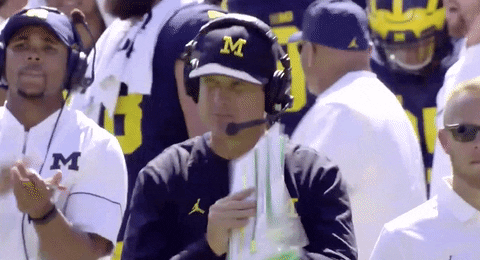Should college football players have draft flexibility? Michigan coach Jim Harbaugh thinks so


There’s nothing like a good, old-fashioned open letter to get your point across.
Jim Harbaugh wants to overhaul the rules of college eligibility of when is the right time to turn pro and enter the draft, as this letter shows. Baseball and hockey already have changed, and basketball is about to change, and Harbaugh wants to empower the student-athlete. pic.twitter.com/lQLb10H8SR
— Adam Schefter (@AdamSchefter) May 7, 2020
On Thursday, Michigan football coach Jim Harbaugh wrote a two-page open letter – one which he addressed to the “College Football Community” – promoting flexibility within the NFL rules regarding the professional eligibility of college football players.
Wrote Harbaugh: “There are ‘early bloomers’ capable of competing in the NFL and earning a livelihood at an earlier age. The goal would be to create a scenario that makes adjustments for all current and future student‐athletes that puts the timeline for transition to professional football at their discretion and that of their family. I propose an option that allows them to make the decision that is best for them.”
Currently, before they can declare for the NFL Draft, amateur football players are required to be three years removed from high school. Then, regardless of their remaining eligibility, players who declare for the draft are not allowed to return to college.
“The individual could choose to declare for the professional draft after any season he chooses.”
Michigan’s Jim Harbaugh has three proposals he believes would help college football players https://t.co/QztUvEOBCz
— Sports Illustrated (@SInow) May 8, 2020
Harbaugh’s proposal included three distinct points:
1. The individual could choose to declare for the professional draft after any season he chooses. If he is drafted within the first 224 picks of the NFL Draft, or chooses to sign a free agent contract, he would forego remaining college eligibility. However, if the individual is not drafted within the first 224 picks of the NFL Draft, he would be able to return to college football if he chooses without penalty, provided he remains in academic compliance and does not receive payment from an agent.
2. The individual leaving college “early” prior to graduation who signs an NFL contract would be entitled to complete his degree while in the NFL, or return to the institution that he left, to continue his college career as a student once his pro career was completed. This would be done at the expense of the University based on a schedule of years participated in college. (For example, if the student‐athlete played one year in college he is entitled to one additional year of paid schooling; if he plays in two or three years in college he is entitled to two additional years of paid schooling; if he plays four years in college he is entitled to one additional year of paid schooling ‐ however, he would no longer have intercollegiate football eligibility). Such a policy promotes higher education as a top priority.
3. A broadening of the rules to permit a student‐athlete and his family to consult with and seek advice on or before signing a professional contract from lawyers and agents so long as the S/A does not receive compensation. The stakes and complexities involved require players to be well informed and this is the time to begin encouraging them to be intelligent and informed.
Sweeping changes, to say the least – but are they necessary? Should players be able to enter the NFL Draft at their own discretion?
Max Kellerman says yes, even though he understands the mental and physical fortitude that it takes to have success in the NFL for young men.
“Tackle football in the NFL, this is not like basketball or baseball or other kinds of sports. This is grown man business and you want those kids to really be physically prepared, as well as mentally and emotionally prepared. And I can appreciate that … but [Harbaugh]is right. If someone’s ready to play, they should be able to play. Let’s make it basic.”
Tony Kornheiser made his case for Harbaugh’s case on Pardon the Interruption on Friday, agreeing wholeheartedly with Harbaugh’s proposal.
“If I could be with somebody more than 100 percent, I would be with Harbaugh more than 100 percent … I think there are some people who are ready to go earlier, like LeBron James. The way he was built, he was ready to go right out of high school.”
Currently, NBA rules require players to be 19 years of age and one year removed from high school in order to enter the NBA Draft. In the MLB, a player is eligible for the draft if he has graduated from high school but not attended college. If that player decides to go to a 4-year university, they must complete at least their junior year or be 21 years of age in order to enter the draft.
Former Pro Bowler and 10-year NFL veteran Jonathan Vilma is split on Harbaugh’s proposal. While he thinks young guys who find immediate success – such as Clemson’s Trevor Lawrence, who guided the Tigers to a national championship as a freshman – should be able to enter the draft early, he doesn’t believe players who declare for the draft should be able to return to college, considering the NFL currently scouts players and informs them of their draft stock before entering the draft.
“I think the players should be able to go and capitalize on their success early on. Trevor Lawrence was the hottest thing since sliced bread after he won the national title and was arguably the No. 1 pick at the time … The second part, I don’t agree with at all, that they should be allowed to come back if they don’t get drafted. There is a process that the college players are allowed to go through to see if they are NFL-ready … The NFL will scout them, watch the film and let them know … their pros and cons.”
Harbaugh’s proposal does have its detractors, such as Stephen A. Smith, who thinks that football is a sport that requires mental and physical maturity that most young men don’t have.
“When it comes to football, because of the violence that it entails, I think those developmental years prior to getting to the elite level are necessary. It may not need to be three years like it is now, but I don’t mind a kid having to wait until he completes his sophomore season on the collegiate level before entering the NFL draft … With football, when you consider the men that play in this game … there’s an elevated level of seriousness that we simply can’t ignore.”
We’ll see if Harbaugh’s suggestions catch the attention of the NCAA and the NFL.
They sure have caught our attention.







